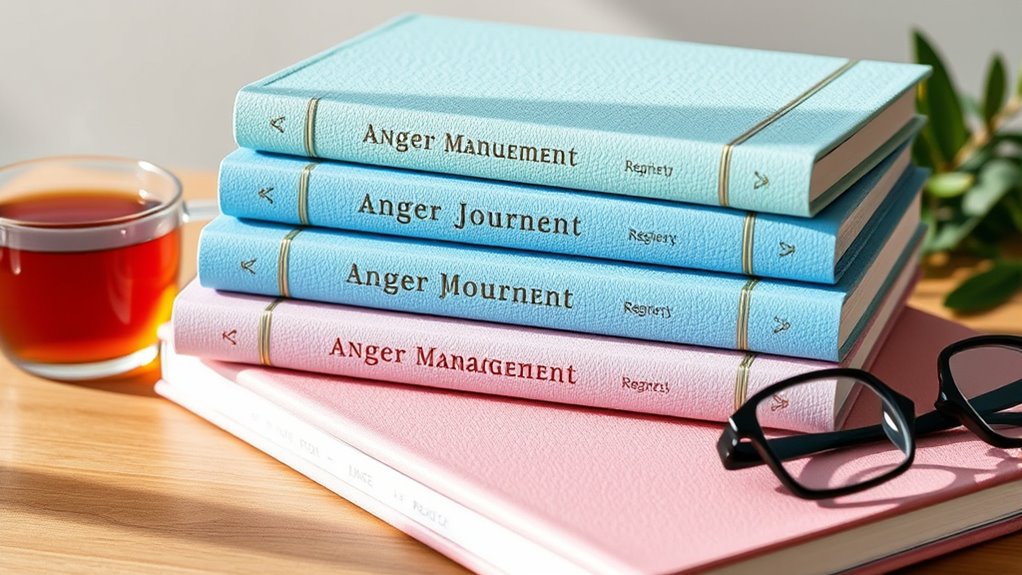If you’re searching for the best anger management journal to find calm and clarity, I recommend one that offers practical tools like reflection prompts, meditation techniques, and personalized planning. Look for a journal that’s user-friendly, easy to navigate, and customizable to suit your needs. Evidence-based methods like mindfulness and cognitive restructuring should be included to support emotional regulation. Keep exploring, and you’ll discover more about a journal that can truly help you manage your anger effectively.
Key Takeaways
- Features structured exercises, reflection prompts, and calming techniques to promote emotional regulation and clarity.
- Designed with user-friendly layouts and accessible language for easy daily use.
- Offers customization options like personalized prompts, goal tracking, and adaptable sections.
- Incorporates evidence-based methods such as mindfulness, cognitive restructuring, and deep breathing.
- Focuses on reducing anger, managing stress, and enhancing emotional awareness through practical tools.
Anger Management Journal for Emotional Balance

If you’re looking to improve your emotional balance, the Anger Management Journal for Emotional Balance is an excellent choice, especially if you want practical tools to manage stress and strengthen your mental resilience. This journal offers exercises, meditation techniques, and daily reflection sheets organized into clear chapters, making it easy to understand and apply. It’s perfect for use at work, during family gatherings, or in personal moments when you need peace and clarity. Designed for professionals, students, and anyone seeking emotional intelligence, it helps you develop better self-awareness and control over strong feelings, fostering lasting emotional stability and psychological well-being.
Best For: individuals seeking practical tools to enhance emotional balance, manage stress, and build resilience across personal and professional settings.
Pros:
- Provides structured exercises, meditation techniques, and reflection sheets for comprehensive emotional management
- Suitable for a wide range of users including professionals, students, and family members
- Promotes long-term psychological resilience and personal growth through easy-to-understand chapters
Cons:
- May require consistent daily commitment for optimal results
- Some users might find the self-guided approach less interactive than therapy sessions
- The effectiveness depends on the user’s willingness to actively engage with the tools provided
Factors to Consider When Choosing Anger Management Journals

When selecting an anger management journal, I focus on practical tools and evidence-based techniques that really work. I also consider how user-friendly it is and whether it offers customization options to fit my needs. Finally, I check if its emotional focus aligns with my goals to make sure it’s a good fit.
Practical Tools Included
Have you considered how practical tools can make a difference in an anger management journal? These features are essential for turning insights into action. Effective journals often include reflection prompts that help me identify my triggers and patterns, making it easier to understand my anger. Many also incorporate exercises like deep breathing, meditation, or mindfulness techniques, which are great for calming myself in real moments. Structured daily or weekly reflection sheets allow me to track progress and reinforce coping strategies, making growth tangible. Personalized planning sections help me set goals and create customized anger management plans tailored to my needs. Overall, these practical tools enhance my ability to apply techniques consistently, building emotional resilience over time and encouraging lasting change.
User-Friendliness Level
Choosing an anger management journal that’s user-friendly makes it much easier to stay consistent with my practice. I look for clear, simple instructions that are easy to understand and follow without confusion. An intuitive layout with organized sections helps me navigate quickly and keeps me engaged. Visual aids like charts or prompts boost my motivation and make tracking progress enjoyable. I prefer language that’s accessible, avoiding complicated jargon that might discourage me. The size and portability of the journal are also important—something manageable I can carry around ensures I won’t skip days. Overall, a user-friendly journal reduces frustration, encourages regular use, and makes my journey toward calm and clarity much smoother.
Customization Options Available
Are you looking for an anger management journal that adapts to your unique needs? Many journals offer customization options like personalized reflection prompts that target your specific emotional triggers, making your journaling more meaningful. Adjustable layouts or sections allow you to focus on different coping strategies or growth goals, so the journal evolves with you. Some journals include customizable goal-setting features, helping you set clear objectives and track progress over time. Interchangeable or expandable sections let you modify content as your emotional needs change. Personalization through handwriting, color coding, or digital tools can boost engagement and keep you motivated. These options make it easier to tailor your journaling experience, ensuring it remains relevant and effective on your journey toward emotional balance.
Evidence-Based Techniques
When selecting an anger management journal, it’s essential to contemplate whether it incorporates proven, evidence-based techniques. Research shows that methods like cognitive restructuring and mindfulness meditation effectively reduce anger and enhance emotional regulation. Incorporating practices such as deep breathing exercises and progressive muscle relaxation can help manage physiological arousal linked to anger. Journals that include these scientifically validated strategies promote better self-awareness and support long-term anger management skills. Techniques supported by clinical studies, especially emotion regulation strategies, tend to be more effective and foster lasting behavioral change. By choosing a journal with evidence-based exercises, you ensure you’re engaging with methods proven to work, increasing your chances of achieving emotional balance and calm in challenging situations.
Emotional Focus Alignment
Selecting an anger management journal that aligns with your emotional goals can make a significant difference in your progress. First, guarantee the journal’s focus matches what you want to achieve—whether it’s reducing anger, managing stress, or improving emotional regulation. Look for journals that emphasize emotional awareness and encourage self-reflection, helping you gain deeper insights into your feelings. Incorporating techniques like meditation, mindfulness, or cognitive restructuring can support your journey toward emotional balance. Additionally, choose a journal that offers tailored exercises and prompts specific to your challenges and growth areas. Finally, verify that the journal’s approach resonates with your preferred style—whether it’s expressive writing, reflective prompts, or practical tools—so you stay motivated and engaged in your emotional development.
Cost and Accessibility
Choosing an anger management journal that fits your budget and accessibility needs is essential for maintaining consistent progress. Look for options that are free or low-cost to ensure you can stick with them long-term without financial stress. Check if the journal is available in different formats—print, digital, or app-based—to match your preferred way of engaging with it. Accessibility is also key; make sure it can be easily purchased or downloaded through local stores, online retailers, or directly from publishers. Be aware of any subscription fees or extra costs that might limit ongoing access. Ultimately, confirm that the platform is compatible with assistive technologies if you have specific accessibility requirements. This way, your journaling journey remains seamless and inclusive.
Frequently Asked Questions
Can Journaling Alone Effectively Manage Anger?
Journaling alone can be quite effective in managing anger, but it works best when combined with other techniques like mindfulness or deep breathing. I’ve found that putting my feelings on paper helps me process emotions and gain clarity. It’s a powerful tool for self-reflection, but I also recommend combining it with relaxation practices to truly find calm and prevent anger from escalating.
How Long Should I Use an Anger Management Journal?
Like a steady river carving its path, I recommend using an anger management journal daily for at least a month. Consistent journaling helps you recognize patterns, process emotions, and build resilience. Keep using it as long as you find it valuable—some stay committed for several months or longer. The key is to stay patient and honest with yourself, allowing the journal to be a trusted guide on your journey to calm and clarity.
Are Digital Journals as Effective as Paper Ones?
Digital journals can be just as effective as paper ones, depending on your preferences. I find that digital options are convenient, portable, and easy to customize, making it simple to record my thoughts anytime. However, I also appreciate the tactile feel of paper journals, which helps me connect more deeply with my emotions. Ultimately, it’s about choosing what feels most natural and motivating for you to stay consistent.
What Are Signs That I Need Professional Help?
If you find yourself feeling overwhelmed or losing control more than usual, it’s time to seek help. Studies show that about 1 in 4 adults experience mental health issues each year. Signs include persistent irritability, difficulty managing anger, or feeling hopeless. If these feelings interfere with your daily life, relationships, or work, reaching out to a professional can provide the support you need to regain balance and clarity.
Can Journaling Improve Long-Term Emotional Resilience?
Yes, journaling can definitely improve long-term emotional resilience. I’ve found that regularly writing about my feelings helps me process emotions, identify patterns, and develop healthier coping strategies. It’s like training my mind to stay calm and focused during tough times. Over time, this practice boosts my confidence and emotional strength, making me better equipped to handle stress and adversity with clarity and patience.
Conclusion
Did you know that journaling can reduce anger by up to 20%? Choosing the right anger management journal can truly transform your emotional well-being. Whether it’s practical tools or customization options that matter most, finding a journal that fits your needs is key. Remember, consistently tracking your emotions helps you gain clarity and find calm. Start today—you might just discover a new path to emotional balance and peace.










